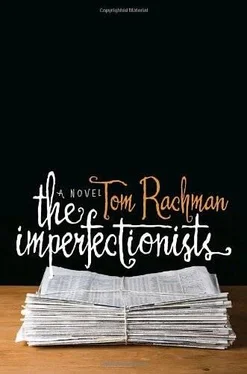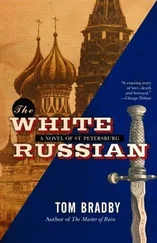Milton's reputation was enhanced by all this, and various midsize U.S. newspapers tried to lure him away. But he had no intention of leaving-this was the best job of his life.
Elsewhere in the Ott Group, matters were more bleak. The problems began when Boyd was peripherally implicated in the fraudulent bankruptcy of a Midwestern bank. He and eight others avoided criminal charges but were fined $120 million. His reputation was further sullied over a stock-fixing scandal involving several Ott Group employees. Boyd himself had no role in it, but a spate of articles conflated his bank scandal with the stock-fixing case. The ugliest blow came in the mid-1980s, when an Ott Group copper subsidiary was found to have dumped toxins into a rural water source in Zambia, causing scores of birth defects. A South African newspaper printed a ghoulish price list that Ott Group reps had used to compensate villagers: $165 for missing limbs, $40 for missing hands, and a diminishing scale from there, concluding with the curiously exact sum of $3.85 per lost toe. Ott Group headquarters claimed ignorance of this but built the villagers new houses nevertheless.
"COLD WAR OVER, HOT WAR BEGINS"
READER-ORNELLA DE MONTERECCHI
SHE HAS BEEN DREADING TOMORROW EVER SINCE IT HAPPENED the first time.
Ornella sits on the sofa in her living room, the paper on her lap, and picks at her lower lip. A faint ripping comes from the kitchen, where the cleaner, Marta, is tearing sheets of paper towel, which she must place between stacked pots and pans to avoid scuffing the surfaces. This is among the many rules that previous cleaners-and there have been dozens-contravened. Some were dismissed for tardiness. Some for impudence. Some stole, or were suspected of it. Others failed to learn, or didn't care to, or left dust under beds. Marta has worked here for almost two years and, so far, is almost without fault, except that she is Polish, which Ornella views as a demerit. Also, Marta has an inappropriately good figure for a cleaner, though her face is a battlefield of acne, which makes up for it. She has a habit of looking down when confused or scolded, staring at the broom bristles and smiling. This has never struck anyone as defiance; it signals submission. Which is best with this mistress, for Ornella's home is a world where it is not possible to be good.
Holding a spray bottle of window cleaner, Marta treads cautiously into the living room in high-heeled cream pumps and nylons, a pencil skirt suit and a lace shawl-hopeless cleaning attire, but she has come directly from Mass. Ornella, who adopted her late husband's distaste for religion, insists that Marta clean every Sunday.
"How was God this morning?" Ornella asks. "Did he have anything nice to say about me?"
Marta smiles automatically, the window before her. It is not clear if she understands. Their common language is English, but Ornella's grasp of it, having used it at a thousand diplomats' dinners, is excellent, whereas Marta's is elementary. She hesitates in case her mistress plans further remarks. When none is forthcoming, she sprays the cleaning fluid in a blue mist that forms into beads on the pane; they hold briefly, then streak downward. She works faster than normal because her husband, Wojciech, is waiting downstairs, sitting on a park bench, leg hopping up and down, scratching dust with his dress shoe, dirtying the hem of his cheap gray suit, which Marta ironed that morning.
"A tribe in Rwanda killed hundreds of thousands of people belonging to another tribe in the past two weeks," Ornella says, slapping the article with the back of her hand. "How is it possible to destroy so many humans so fast? Even in practical terms, how? And why didn't the paper say anything about this when it was going on? Why only at the end?" She glances at Marta, who is wiping her way down the window. Ornella continues: "Lloyd Burko, in his piece, makes the point that it's not just the Africans. The Yugoslavians are as bad, and they're Europeans. Everyone's killing everyone else. Maybe it was better during the Cold War. You probably don't agree, Marta-you were right in it, weren't you. Being a Pole. But at least that war was cold. Listen to this: 'Peace is a state humanity will not tolerate. Man's instinct is to commit violence.' That's from Lloyd Burko's piece. Is that true? I can't believe it is."
Marta collects the remaining cleaning rags around the apartment, rinses them, wrings them out, stashes them under the kitchen sink. For the final task of her day, she carries the stepladder into the hall and climbs to the top rung to reach the storage space, which is crammed full of copies of the paper. Editions that Ornella has read are placed to the left; unread copies are on the right. Marta reaches for tomorrow's, April 24, 1994.
"No!" Ornella cries, clamping her hands to the stepladder. "I don't want that one yet. I'll ask you for it when I want it. I'm still on April twenty-third. I'll let you know, Marta. Don't just push ahead like that, assuming."
Marta descends the ladder and takes her pay-twenty euros-her head bowed, murmuring. She hastens out of the apartment, exhaling only when she is a full flight down the stairs.
Ornella snoops around to ensure that she has not been cheated of twenty euros: hallway, bedroom, en suite bathroom, study, dining room, kitchen, terrace, guest room, guest bathroom, living room. Marta is impeccable, as usual, and this doesn't especially please Ornella.
She seats herself on the sofa and clears her throat, blinks as if to sharpen her vision, and surveys the front page of April 23, 1994, the same front page she has been stuck on for three weeks. It is a day she cannot surmount. Tomorrow-April 24, 1994-is too hard to bear again.
She has read every copy of the paper since 1976, when her husband, Cosimo de Monterecchi, was posted to Riyadh. He, the Italian ambassador, traveled without restriction in Saudi Arabia. But she, as a woman, was effectively detained in a guarded zone for Westerners, while her two sons attended the international school all day. From boredom, she took to reading the paper, which in the late 1970s was one of the few foreign periodicals available in the kingdom. She had never learned the technique of newspaper reading, so took it in order like a book, down the columns, left to right, page after page. She read every article and refused to move on until she was done, which meant that each edition took several days to complete. Much was confusing at first. At night, she posed questions to Cosimo, initially basic ones like "Where is Upper Volta?" Later, her queries grew more complex, such as "If both the Chinese and the Russians are Communists, why do they disagree?" Until she was posing questions about the Palestinians' role in Jordanian affairs, infighting among apartheid opponents, and supply-side economics. Cosimo occasionally referred to an event that she hadn't reached yet, spoiling the surprise, so she gave him strict orders not to leak anything, even in passing. Thus began her slow drift from the present.
One year into her newspaper reading, she was six months behind. When they returned to Rome in the 1980s, she remained stranded in the late 1970s. When it was the 1990s outside, she was just getting to know President Reagan. When planes struck the Twin Towers, she was watching the Soviet Union collapse. Today, it is February 18, 2007, outside this apartment. Within, the date remains April 23, 1994.
These are her day's headlines: "Thousands Slain in Rwanda, Red Cross Fears;" "Mandela Set to Win South Africa Elections;" "After Suicide, 'Grunge' Star Cobain Viewed as Icon;" "Cold War Over, Hot War Begins." This last piece is a news analysis by the paper's Paris correspondent, Lloyd Burko, who reported on the siege of Sarajevo, and compares the slaughter in Yugoslavia to the recent massacres in Rwanda.
Читать дальше












